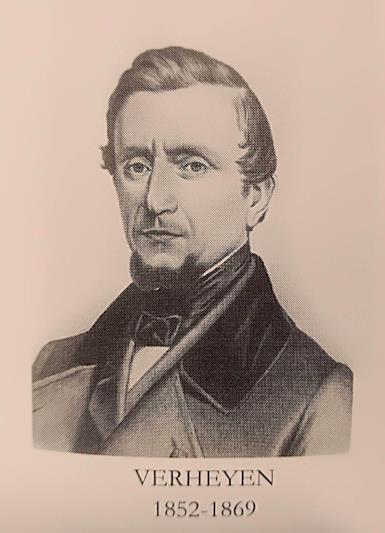Napoleon Joseph Verheyen, born the 29 December 1807 in Antwerp and died on 14 february 1869 in Brussels, is a magistrate, high official, and administrator of Public Security and prisons 1852 to 1869. He comes from the union between Joseph Tobie Verheyen, Brussels insurance agent and Jeanne Marie Genoels, annuitant from Antwerp.
In 1825, at the age of seventeen, Napoléon Verheyen returns to Ghent University to study law. He had just obtained the title of doctor of law when the revolutionary events of September occurred. 1830 who confronts him, for the first time, to public safety issues. Indeed, the situation in his hometown of Antwerp is unstable with numerous fires during the month of October 1830. Since then, Napoleon Verheyen participates, from the 28 october 1830, to public safety commissions, intended to calm the situation. Tranquility brought back to the city of Antwerp, the members of this public safety organization receive the most laudatory thanks from the constituted authorities. Thereafter and until January 1833, other commissions are created in order to take all useful measures to safeguard public order, they had to prevent fires but also monitor foreigners whose actions appeared dangerous. Napoleon Verheyen, member of the seven public safety and fire committees in Antwerp, therefore provides considerable services to the metropolis of Antwerp and to Belgium. At that time, Napoleon Verheyen is only twenty-two years old, but he is already one of the most active agents of these committees. Indeed, the 22 august 1832, Charles Rogier, then governor of Antwerp, evokes Verheyen as being the person who rendered the most services to the cause of the revolution through his talent, its activity, and its energy. By his zealous and patriotic attitude, he has the merit of protecting the bourgeoisie which was hesitant, more willing to oppose his work than to help him in his projects.
Intelligent, young, tireless worker, Napoléon Verheyen enters the judiciary in Antwerp where the functions of the public prosecutor's office presented many difficulties at this time. The provisional government appointed him substitute for the King's prosecutor on 5 november 1830. At twenty-nine, he is appointed Crown Prosecutor at the Antwerp Court of First Instance. The 9 april 1842, he continues his career in the judiciary as King's Prosecutor of the Court of First Instance of Brussels.
The Secretary General of the Ministry of Justice, M. Putzeys, speaks of Verheyen as someone with a spirit of moderation and fairness whose actions were marked by loyalty and tact. Finally, by royal decree of 8 janvier 1852, he is appointed administrator of Public Security and prisons. What a post, he is charged with a heavy task: restore within a neglected administration, order and discipline essential to national security. He heads this service, to his death, for more than seventeen years, demonstrating unparalleled talent and quite remarkable tact.
Napoleon Verheyen was married on 29 september 1842, in Maransart, with Adèle Joséphine Brunard. The couple mainly lived in 56, Boulevard de Waterloo in Brussels. They had two daughters – Sidonie and Honorine Verheyen, as well as grandchildren. It should be noted that his wife comes from a family of large landowners in Walloon Brabant.. Some members of this liberal family are also important figures of the time.. Especially his father, Hubert Frédéric Brunard who is the mayor of the commune of Maransart. This one had made Maransart, one of the most modern municipalities for the time, including many paved roads. Furthermore, one of his brothers, Charles Dominique Brunard is senator. With this union, Napoléon Verheyen therefore joined a very wealthy family.
It can also be mentioned that Napoleon Joseph Verheyen is appointed, the 18 janvier 1844, knight of the order of Leopold.
Sources:
- E. THE LOIRE, « Verheyen (Napoleon Joseph) », in National biography, Royal Academy of Sciences, letters and fine arts of Belgium, t. 26, Brussels, 1936-1938, p. 641-644.
- Luke KUNINGS, Such quiet fonts, A history of the Belgian police apparatus in the 19th century, Louvain-la-Neuve, 2009.
- Eric MEUWISSEN, The great fortunes of Brabant, lords of the earth, captains of industry, 1994.
- France NEZER, Belgian Public Security facing foreign gypsies (1858-1914), Louvain-la-Neuve, Leuven University Press, 2011.
- Official Royal Almanac of Belgium, Brussels, 1845.
Thomas Ruelle
Notice written as part of the Seminar on the History of the Contemporary Period of the Catholic University of Louvain (LHIST2280, teacher Emmanuel Debruyne).
| Previous record | Next record |
